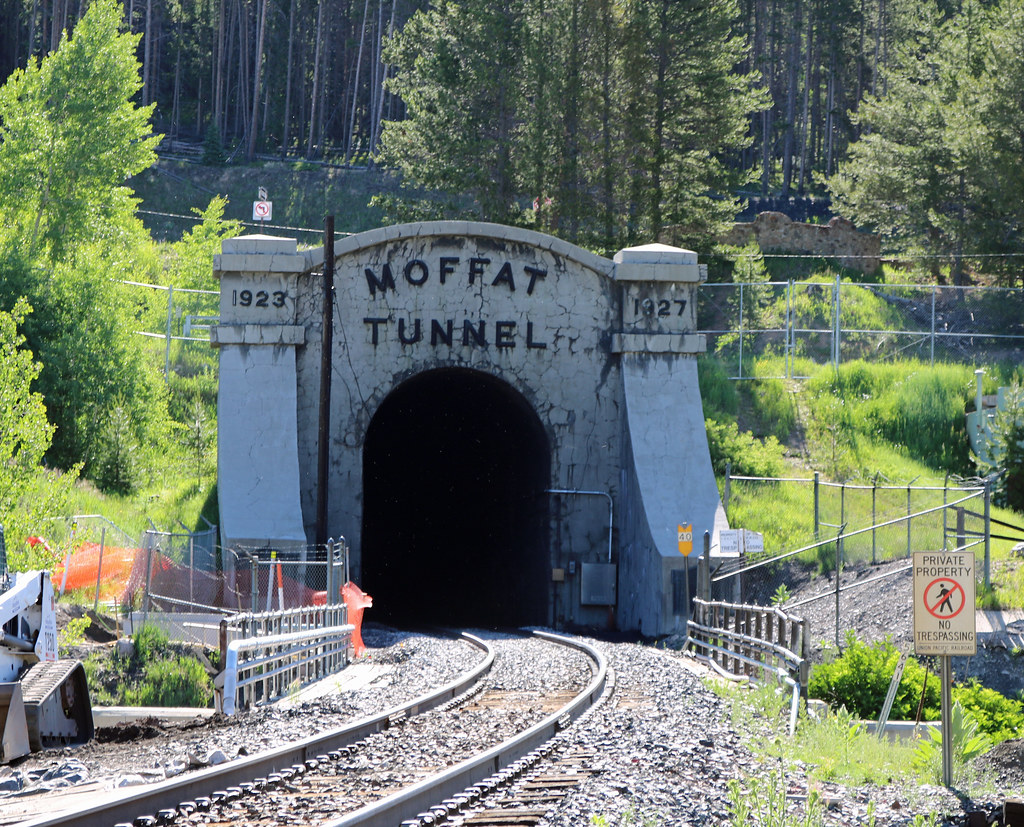
The Moffat Tunnel (West Portal) train observation spot is located near Winter Park, Colorado. It offers a unique vantage point to watch trains emerge from the historic Moffat Tunnel, which cuts through the Continental Divide. Surrounded by stunning mountain scenery, it's a popular spot for rail enthusiasts and photographers.
Photos
Sign in to upload photos
No Photos Yet
Be the first to share photos of this location!
Moffat Tunnel (West Portal) – Winter Park, Colorado, USA | Train Spotting Location
Trainspotting Experience
A typical visit rewards you with up-close, unobstructed views of trains emerging from darkness into daylight. The portal complex sits in a broad, gently sloping clearing, so railfans can stand near the right-of-way fence or hike a few steps up adjacent hillsides for elevated perspectives. Expect locomotives to throttle up as they exit the 6.2-mile tunnel and tackle the slight downhill grade toward Fraser Valley; the sudden change in acoustics amplifies engine rumble and dynamic braking growls. Trains usually roll at 25–30 mph on exiting, then accelerate once clear of the signal block, giving ample time for photos, car counts, and wave exchanges with crew. Vent fans atop the 1920s concrete headhouse kick on between movements, adding industrial ambience. Because the portal area is relatively remote, ambient noise is minimal—just wind in the pines and the occasional shout from nearby mountain-bike trails at Winter Park Resort.
Landscape, Setting & Local Atmosphere
Perched around 9,200 ft above sea level, the West Portal is surrounded by lodgepole pine, spruce, and fir, with rocky outcrops framing the track. To the east rise the snow-clad peaks of the Continental Divide; to the west, the Fraser River valley opens toward meadows and willows. Wildflowers blanket the ground in midsummer, while late autumn brings golden aspen just downhill. Weather is notoriously changeable: dazzling sun can yield to afternoon thunderstorms in minutes, and snow showers are possible ten months of the year. The thin mountain air carries a crisp scent of resin and moss, enhancing the feeling of wilderness despite the presence of steel rails and massive ventilation buildings.
Type & Frequency of Train Activity
Union Pacific owns the line and dispatches the tunnel, handling an average of 15–25 trains daily, though numbers vary with seasonal traffic and track work. Expect long manifest freights, unit coal and grain trains, plus articulated double-stack intermodals climbing to and from the Denver gateway. BNSF Railway exercises trackage rights and typically contributes several coal or mixed merchandiser movements each day. Passenger action comes from Amtrak’s California Zephyr, which glides through westbound mid-morning and eastbound late afternoon, providing a welcome splash of Superliner stainless steel amid the freight lash-ups. Train lengths frequently exceed 100 cars, with distributed power units common on heavier consists.
Best Angles for Photos & What Railfans Enjoy Most
- Fence Line Close-up: Stand near the portal’s chain-link boundary to capture dramatic head-on shots as locomotives pierce daylight—the iconic “mouth of the tunnel” framing the lead unit. Morning light from the southeast illuminates noses; afternoon backlighting works for silhouettes.
- South Hillside: A short scramble yields a 30-ft elevation gain and broadside view of entire consists curving away, the concrete headhouse and divide peaks in the background. Late afternoon sun lights train sides and mountains evenly.
- Winter Park Ski Runs: In winter, skiers on the Mary Jane slopes can photograph trains from above with telephoto lenses, creating dynamic compositions of steel against white snow fields.
Tripods are advisable for low-light winter shots, and neutral-density filters tame bright snow glare. Drone use is restricted by resort and Forest Service regulations, so ground-based creativity pays off.
Historical or Cultural Relevance
Completed in 1928 after five arduous years of drilling, the Moffat Tunnel was a marvel of its era, shortening the Denver-Salt Lake mainline by 176 miles and eliminating 2,300 ft of summit elevation compared with Rollins Pass. It bears the name of Denver financier David H. Moffat, whose vision of a direct rail route through the Rockies spurred its creation. The West Portal retains original Art Deco concrete architecture, ventilation stacks, and fan house that once extracted steam-locomotive smoke. Nearby plaques commemorate the workers who braved harsh winters, and the tunnel is listed on the National Register of Historic Places, underscoring its engineering significance.
What Makes This Spot Different
Few North American locations let you watch trains explode from a six-mile mountain tunnel at over 9,000 ft elevation while standing mere yards away. The combination of extreme altitude, unpredictable alpine weather, historic portal architecture, and steady modern freight action sets Moffat Tunnel West Portal apart from more accessible but less dramatic plains or canyon sites. Add the opportunity to couple railfanning with skiing, mountain biking, or hiking at Winter Park, and you have a multifaceted destination unmatched in variety.
Localisation
Coordonnées :39.887765, -105.761207
Seasonal Information
For observing trains at the Moffat Tunnel (West Portal) near Winter Park, Colorado: - **Spring/Fall**: Enjoy mild weather and vibrant scenery. - **Summer**: Longer daylight, but prepare for crowds and sun. - **Winter**: Snowy landscapes offer stunning views; dress warmly and check for delays.
Other Interesting Locations
Looking for more spots? Browse the complete list of train spotting locations.
Quick Information
Country
USA
Region / State / Province
Colorado
City
Winter Park
Spot Type
Tunnel
Best Times
The best hours to observe trains at Moffat Tunnel (West Portal) are typically during daylight, especially morning and late afternoon, for optimal lighting and frequent train activity.
